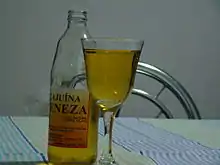Cajuína
Cajuína (Brazilian Portuguese: [kaˌʒuˈinɐ]) is a non-alcoholic, non-carbonated beverage made of blended cashew apples. It is traditional in the northeast region of Brazil, especially in the states of Ceará and Piauí.
It was invented by writer and pharmacist Rodolfo Teófilo in the 1890s, who sought to find a healthier alternative to alcoholic beverages.[1][2][3] Cajuína is produced by Appert's method—that is, heating clarified cashew juice in a sealed container. The caramelization of its sugars gives cajuína its flavor and distinctive golden color. The process also sterilizes the beverage, allowing it to be stored for long periods.
Somewhat confusingly, a cashew-flavored carbonated soda is also popularly known as cajuína in Ceará and Piauí.
References
- Cearense, Entre-lugar Na Literatura (2021-01-27). "O Entre-lugar na Literatura Cearense: Rodolfo Teófilo e a invenção da Cajuína". O Entre-lugar na Literatura Cearense. Retrieved 2023-09-02.
- "Rodolfo Teófilo já combateu epidemia em Fortaleza; relembre trajetória do farmacêutico e escritor - Verso". Diário do Nordeste (in Brazilian Portuguese). 2020-04-01. Retrieved 2023-09-02.
- "08 Art Rodolfo Theophilo" (PDF). Institudo Ceara.
Further reading
- Melo-Cavalcante, Ana Amelia; Picada, Jaqueline N.; Rubensam, Gabriel; Henriques, João A.P. (2008). "Antimutagenic activity of cashew apple (Anacardium occidentale Sapindales, Anacardiaceae) fresh juice and processed juice (cajuína) against methyl methanesulfonate, 4-nitroquinoline N-oxide and benzo[a]pyrene". Genetics and Molecular Biology. 31 (3): 759–766. doi:10.1590/S1415-47572008000400024.
- Nascimento, Ronaldo Ferreira do; Aquino, Francisco Wendel Batista de; Amorim, Adriany G. Nascimento; Prata, Laércio Favila (August 2003). "Avaliação do tratamento térmico na composição química e na qualidade da cajuína" [Evaluation of the thermal treatment on the chemical composition and quality of 'cajuína' beverage]. Ciência e Tecnologia de Alimentos (in Portuguese). 23 (2): 217–221. doi:10.1590/S0101-20612003000200020.
This article is issued from Wikipedia. The text is licensed under Creative Commons - Attribution - Sharealike. Additional terms may apply for the media files.
